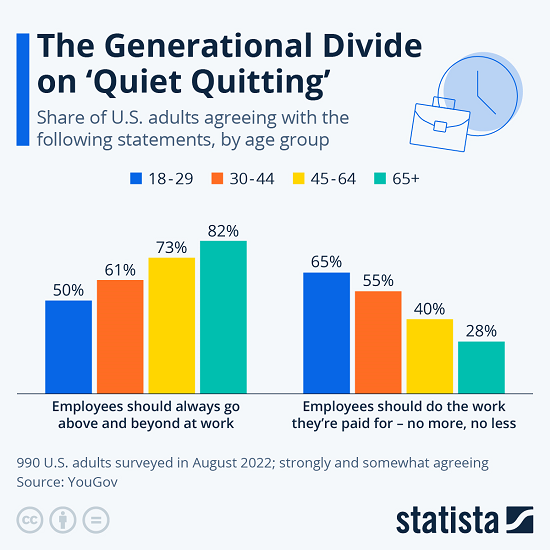
My projections are: less premium work gets done; less work of any quality gets done; those carrying the majority of the weight burn out and stop and everybody marvels why the quality of products and services is sinking to new lows.
Given that we just track what we measure, whatever isn’t quickly quantifiable isn’t even on the radar screen. While we determine the number and kind of jobs and the percentage of the population who are used, and so on, the less measurable attributes of work and jobs are not commonly recognized, discussed or understood.
One such difficult-to-quantify element is how requiring tasks are today compared to the very same work a generation or 2 ago. Take the “burger-flipping” fast-food jobs that are so often dismissed as low-skill work. What few outside the fast-food industry seem to recognize is how demanding “burger-flipping” work is now. It is a high-pressure “factory” enhanced for production of fast-food meals with the minimum personnel.
It is hard work. Lots of people can’t maintain the speed and perform all that is demanded.
The same can be said for many other tasks that are assumed to be low-skill and for that reason “easy.” In the unrelenting drive to reduce expenses, staffing is trimmed, experienced employees let go and changed with trainees, and more work is piled on those still on personnel.
This is similarly real of high-skilled tasks: staffing is decreased, open positions remain open for months or years, the work experience and knowledge of those retiring isn’t matched by the frequently inadequately trained replacement employees.
Supervisors who once had an admin assistant are now their own admin. The work that was when divvied up amongst three tasks now falls on one employee.
The obsessive drive to increase profits by decreasing labor costs has actually been the norm for the previous 20 years. Globalization is one dynamic pressing continuous cost-cutting, therefore is the ever-higher expenses of labor overhead, with employee healthcare being the primary source of shocking boosts in the cost of staff members. Keep in mind the workers don’t see this expense; they see their take-home pay stagnating but not the skyrocketing costs of healthcare insurance coverage paid by their company.
This raises another hardly ever measured aspect in jobs/work: the sheer decline of security. Employers use laid-off workers contract positions that pay $10 more per hour but offer no health care, retirement, disability insurance, etc, all of which expense the company $15/hour. The employer cuts overall costs of labor and offloads all the accounting and management of health care, retirement funds, paying projected taxes for earnings, Social Security and Medicare, etc on the recently minted agreement employee, a number of whom are ill-prepared for these additional problems of self-employment.
It’s not just that salaries have stagnated and job security has actually sloped; the workload has increased, frequently dramatically. Yes, there are still Big Tech jobs that appear to be inessential to the operation of the enterprise, but these are being slashed by the tens of thousands. But as a general rule, the work has actually increased while job security and the means to get the job done have both declined precipitously.
This disintegration has been so gradual that few seem familiar with the dramatic modifications in the nature of work/employment over the previous 40 years.
Equally consequential decreases have actually happened in the capacity of the labor force to do difficult, demanding tasks. As the basic health of the population has decreased, less individuals have the physical endurance and strength to do the physical work. (Try lifting a hotel mattress to change the sheets. Mindful, your back might blow out.)
Others do not have the requisite social abilities (the demands for these abilities have actually also increased) or intellectual capacity or appropriate training or the will to sustain demanding work.
2 generations back, there were still undemanding tasks for individuals who for whatever factor are not able to do demanding work, or who select not to. Today, most tasks are requiring.
You see the problem. A labor force with reducing capability/ will to do requiring work and a company class that has actually relentlessly increased demands on the labor force while eroding security.
Numerous assume whatever work people struggle to do or no longer want to do will be carried out by automation/robots. Regardless of the advances in automation, this presumption may not play out as seamlessly as proponents think. If jobs might have been done by robots for less cash, they would currently have actually been automated. It isn’t rather as easy as it may look from the exterior.
My forecasts based upon the above are: less premium work gets done; less work of any quality gets done; those bring the majority of the weight stress out and quit and everyone marvels why the quality of items and services is sinking to new lows.

New Podcast: Turmoil Ahead As We Enter The New Period Of’ Scarcity ‘(53 minutes)
 My new book is now offered at a 10% discount ($8.95 ebook, $18 print): Self-Reliance in the 21st Century.
My new book is now offered at a 10% discount ($8.95 ebook, $18 print): Self-Reliance in the 21st Century.
Read the first chapter totally free (PDF)
Read excerpts of all three chapters
Podcast with Richard Bonugli: Self Reliance in the 21st Century (43 minutes)
My current books:
The Asian Heroine Who Seduced Me (Novel) print $10.95, Kindle $6.95 Read an excerpt free of charge (PDF)
When You Can’t Go On: Burnout, Reckoning and Renewal $18 print, $8.95 Kindle ebook; audiobook Check out the very first section for free (PDF)
Global Crisis, National Renewal: A (Revolutionary) Grand Technique for the United States (Kindle $9.95, print $24, audiobook) Read Chapter One free of charge (PDF).
A Hacker’s Teleology: Sharing the Wealth of Our Diminishing World (Kindle $8.95, print $20, audiobook $17.46) Read the first area for free (PDF).
Will You Be Richer or Poorer?: Revenue, Power, and AI in a Shocked World
(Kindle $5, print $10, audiobook) Read the very first section free of charge (PDF).
The Experiences of the Consulting Thinker: The Disappearance of Drake (Novel) $4.95 Kindle, $10.95 print); read the very first chapters totally free (PDF)
Money and Work Unchained $6.95 Kindle, $15 print) Read the first area for free
Become a $1/month client of my work through patreon.com.
KEEP IN MIND: Contributions/subscriptions are acknowledged in the order received. Your name and e-mail remain personal and will not be provided to any other individual, company or firm.
|
Thank you, Neil C. ($108), for your outrageously generous contribution to this website– I am significantly honored by your support and readership. |
Thank you |
, Simon K.W. ($80 HK), for your marvelously generous contribution to this site– I am considerably honored by your unfaltering assistance and readership. |

